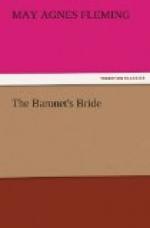The surgeon did his best, and was liberally paid out of the three hundred pounds which Mrs. Denover had found in the bosom of Harriet’s dress. But for days and weeks she lay very ill—ill unto death—delirious, senseless. Then the fever yielded, and death-like weakness ensued.
This, too, passed; and by the time the “Angelina” reached New York, the poor girl was able to saunter up and down the deck, and drink in the life-giving sea air.
Thus, while fruitless search was being made for G. W. Parmalee throughout London—while detectives examined every passenger who sailed in the emigrant ships—he was safely skimming the Atlantic in Captain Dobb’s cockleshell.
To do him justice, he never thought—and no more did Harriet—of what might follow her disappearance. The baronet would leave the country, they both imagined, and her fate would remain forever a mystery.
So the supposed dead bride reached New York in safety, and that body washed ashore and identified by Sybilla Silver, to suit her own ends, was some nameless unfortunate.
On the pier in New York Mr. Parmalee and Lady Kingsland parted.
“I am going to my uncle’s house,” she said; “my mother’s brother. Hugh Denover is a rich merchant, and will receive us, I know. Keep my story secret, and come and see me next time you visit New York. Here is my uncle’s address; give me yours, and if ever it is in my power, I will not forget how nobly you have acted and how inadequately you have been repaid.”
They shook hands and parted.
Mr. Parmalee went “down East,” not at all satisfied with his little English speculation. He had lost a handsome reward and a handsomer wife. He dared hardly think to himself that Sybilla had done the horrid deed, and he had never breathed his suspicion to Harriet.
“Let her think it’s the baronet, if she’s a mind to. I ain’t a-going to do him a good turn. But I know better.”
Harriet and her mother sought out Mr. Denover. He lived in a stately up-town mansion, with his wife and one son, and received both poor waifs with open arms. His lost sister had been his boyhood’s pet; he had nothing for her now but pity and forgiveness, when she looked at him with death in her face.
“My poor Maria, don’t talk of the wretched past. I love my only sister in spite of all, and neither she nor her child shall want a home while I have one.”
Harriet told her story very briefly. Her father had been dead for two years. She had married; she had not lived happily with her husband, and they had parted. She had come to Uncle Hugh; she knew he would give his sister’s daughter a home.
She told her story with dry eyes and unfaltering voice; but Mr. Denover, looking in that pale, rigid young face, read more of her despair than she dreamed.
“Her husband has been some English grandee, like Captain Hunsden, I dare say,” he thought, “proud as Lucifer, and when he discovered that about her mother, despised and ill-treated her.”




